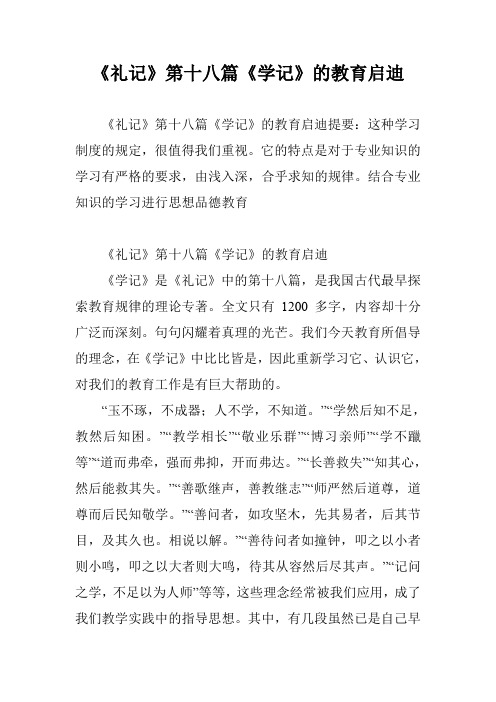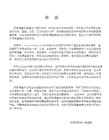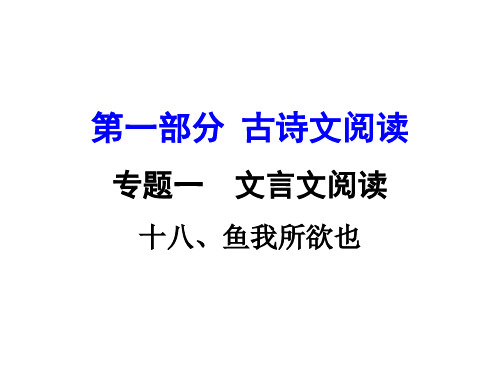第十八篇
- 格式:doc
- 大小:15.50 KB
- 文档页数:2

《礼记》第十八篇《学记》的教育启迪《礼记》第十八篇《学记》的教育启迪提要:这种学习制度的规定,很值得我们重视。
它的特点是对于专业知识的学习有严格的要求,由浅入深,合乎求知的规律。
结合专业知识的学习进行思想品德教育《礼记》第十八篇《学记》的教育启迪《学记》是《礼记》中的第十八篇,是我国古代最早探索教育规律的理论专著。
全文只有1200多字,内容却十分广泛而深刻。
句句闪耀着真理的光芒。
我们今天教育所倡导的理念,在《学记》中比比皆是,因此重新学习它、认识它,对我们的教育工作是有巨大帮助的。
“玉不琢,不成器;人不学,不知道。
”“学然后知不足,教然后知困。
”“教学相长”“敬业乐群”“博习亲师”“学不躐等”“道而弗牵,强而弗抑,开而弗达。
”“长善救失”“知其心,然后能救其失。
”“善歌继声,善教继志”“师严然后道尊,道尊而后民知敬学。
”“善问者,如攻坚木,先其易者,后其节目,及其久也。
相说以解。
”“善待问者如撞钟,叩之以小者则小鸣,叩之以大者则大鸣,待其从容然后尽其声。
”“记问之学,不足以为人师”等等,这些理念经常被我们应用,成了我们教学实践中的指导思想。
其中,有几段虽然已是自己早就知道的,但从2000多年前的古书上读到,却又有更深的感受。
一、培养目标“比年入学,中年考校。
一年视离经辨志;三年视敬业乐群;五年视博习亲师;七年视论学取友,谓之小成。
九年知类通达,强立而不反,谓之大成。
夫然后足以化民成俗,近者说服,而远者怀之,此大学之道也。
记曰:‘蛾子时术之’,其此之谓乎!”其大意为:学生每年入学,每隔一年要考查学生的学习成绩。
第一年考查学生分析经义和章句的能力,辨别他们的志趣。
第三年考查学生专业思想是否坚定,与同学之间的关系是否能和睦相处。
第五年考查学生的知识是否广博,对教师是否尊敬。
第七年考查学生研讨学术上的水平和选择朋友的能力。
如果能达到上述的标准,这就叫做小成。
到第九年,学生在学业上已能触类旁通,并且在见解行动上能够坚定不移,不再出现反复现象,这就叫做大成。


史记第十八篇原文与解析史记是中国历史上第一部纪传体通史,由西汉末年史学家司马迁所著。
全书共记载了从上古到公元前90年的历史,分为本纪、表、书、世家、列传等五部分。
其中,第十八篇以"孝文本纪"为题,是史记中重要的篇章之一。
孝文本纪是史记中的一篇本纪,记载了汉景帝、汉文帝(儿子)等人的事迹。
本文以探究汉朝早期历史为主题,为读者呈现了中国古代社会的风貌和当时的政治局势。
全文分为三个部分,分别是景帝之称霸、景帝之平宗室和文帝之起居。
整篇文章围绕历史人物的事迹展开,描述了他们在政治、军事等方面的贡献和成就。
在第一部分中,文章介绍了景帝时期的政治形势和他的执政之道。
景帝以仁政著称,推崇儒学,注重养民、富国。
他致力于扶持百姓,修养国家经济,加强军事实力,使国家逐渐强大起来。
在第二部分中,文章描述了景帝时期宗室之乱的局面以及景帝采取的应对措施。
当时,宗室内乱严重,争夺权力,危及国家安稳。
景帝采取了多种手段,压制宗室势力,保证国家的稳定和统一。
最后,在第三部分中,文章转向了汉文帝的执政情况。
文帝是汉景帝的儿子,承袭了父亲的政治理念,并逐渐推行了一系列改革措施。
他注重教育,提倡儒学,推动了社会的进步和文化的繁荣。
通过史记第十八篇的原文与解析,我们可以感受到汉朝早期的历史风貌和背后的故事。
这篇篇章以客观的史实和详细的描写,展现了当时社会政治的发展和演变,同时也揭示了古代政治家的智慧和才干。
史记作为中国历史文化的瑰宝,对于研究中国古代历史和文化有着重要的价值。
通过深入了解史记第十八篇的内容,我们能更好地理解中国古代社会、政治和人物之间的关系,从而更好地把握中国历史的发展脉络。
总而言之,史记第十八篇《孝文本纪》以其丰富的内容和精湛的叙述技巧,为我们展示了汉朝早期的历史图景。
这篇篇章以客观的史实和细致入微的描写,生动地再现了当时政治家和君王们的智慧和才干。
阅读史记第十八篇,不仅可以了解古代历史,还能领略中国古代文化的博大精深。

礼记第十八篇原文与解析礼记是中国古代的一部重要经典之一,它记录了古代礼仪制度和思想观念。
第十八篇是礼记中的一篇章节,本文将对其进行原文与解析的介绍。
【节选原文】孔子曰:“凡不含德而独得口誉者,必有所短。
”孔子曰:“不听老人言,吃亏在眼前。
”孔子曰:“非礼勿视,非礼勿听,非礼勿言,非礼勿动。
”孔子曰:“青,取之于蓝而青于蓝;冰,水为之而寒于水。
木直中绳,輮以为轮,其曲中规。
”孔子曰:“有朋自远方来,不亦乐乎?人不知而不愠,不亦君子乎?”孔子曰:“知者不惑,仁者不忧,勇者不惧。
”孔子曰:“士不可以不弘毅,任重而道远。
仁以为己任,不亦重乎?死而后已,不亦远乎?”孔子曰:“学而时习之,不亦悦乎?有朋自远方来,不亦乐乎?人不知而不愠,不亦君子乎?”孔子曰:“不患人之不己知,患不知人也。
”孔子曰:“己所不欲,勿施于人。
”【解析】本篇所记载的是孔子的一些经典言论,对礼法、人生和品德等方面进行了深入的思考和论述。
下面对其中几句话进行简单的解析:1. “凡不含德而独得口誉者,必有所短。
”这句话强调了道德的重要性,认为那些只得到口碑却缺乏真正德行的人,必然在其他方面存在不足之处。
2. “不听老人言,吃亏在眼前。
”这句话告诫人们要尊重老人的意见和经验,避免因不听老人的忠告而遭受损失。
3. “非礼勿视,非礼勿听,非礼勿言,非礼勿动。
”这句话强调了礼仪的重要性,意味着我们在面对不合礼仪的行为时,应该积极回应,并以正确的方式处理。
4. “青,取之于蓝而青于蓝;冰,水为之而寒于水。
木直中绳,輮以为轮,其曲中规。
”这句话意味着只有在原有的基础上提高自己,才能更加出色。
就像青色是从蓝色中提取出来的一样,冰的寒冷是由水来决定的。
5. “知者不惑,仁者不忧,勇者不惧。
”这句话表达了知识、仁爱和勇敢对于一个人的稳定和自信的重要性。
只有在具备了这些品质之后,人们才能在人生的道路上走得更加坚定。
6. “学而时习之,不亦悦乎?”这句话强调了学习和实践的关系,学习应该是一种快乐的过程,只有不断地练习和巩固,才能使所学知识变得更加熟练和牢固。

新SAT官方指南阅读第十八篇全解析This passage is adapted from Emily Anthes,Frankenstein's Cat.©2013by Emily Anthes.When scientists first learned how to edit the genomes of animals,they began to imagine all the ways they could use this new power.Creating brightly colored novelty pets was not a highpriority.Instead,most researchers envisioned far more consequential applications,hoping tocreate genetically engineered animals that saved human lives.One enterprise is now delivering on 5this dream.Welcome to the world of“pharming,”in which simple genetic tweaks turn animals into living pharmaceutical factories.Many of the proteins that our cells crank out naturally make for good medicine.Our bodies’own enzymes,hormones,clotting factors,and antibodies are commonly used to treat cancer,diabetes,autoimmune diseases,and more.The trouble is that it’s difficult and expensive to make 10these compounds on an industrial scale,and as a result,patients can face shortages of themedicines they need.Dairy animals,on the other hand,are expert protein producers,their udders swollen with milk.So the creation of the first transgenic animals—first mice,then otherspecies—in the1980s gave scientists an idea:What if they put the gene for a human antibody or enzyme into a cow,goat,or sheep?If they put the gene in just the right place,under the control of the right molecular switch,maybe they could engineer animals that produced healing human15proteins in their milk.Then doctors could collect medicine by the bucketful.Throughout the1980s and’90s,studies provided proof of principle,as scientists created transgenic mice,sheep,goats,pigs,cattle,and rabbits that did in fact make therapeutic compounds in their milk.At first,this work was merely gee-whiz,scientific geekery,lab-bound thought20experiments come true.That all changed with ATryn,a drug produced by the Massachusetts firm GTC Biotherapeutics.ATryn is antithrombin,an anticoagulant that can be used to preventlife-threatening blood clots.The compound,made by our liver cells,plays a key role in keeping our bodies clot-free.It acts as a molecular bouncer,sidling up to clot-forming compounds andescorting them out of the bloodstream.But as many as1in2,000Americans are born with a25genetic mutation that prevents them from making antithrombin.These patients are prone to clots, especially in their legs and lungs,and they are at elevated risk of suffering from fatalcomplications during surgery and childbirth.Supplemental antithrombin can reduce this risk,and GTC decided to try to manufacture the compound using genetically engineered goats.To create its special herd of goats,GTC used microinjection,the same technique that30produced GloFish and AquAdvantage salmon.The company’s scientists took the gene for human antithrombin and injected it directly into fertilized goat eggs.Then they implanted the eggs in the wombs of female goats.When the kids were born,some of them proved to be transgenic,thehuman gene nestled safely in their cells.The researchers paired the antithrombin gene with apromoter(which is a sequence of DNA that controls gene activity)that is normally active in the 35goat’s mammary glands during milk production.When the transgenic females lactated,thepromoter turned the transgene on and the goats’udders filled with milk containing antithrombin.All that was left to do was to collect the milk,and extract and purify the protein.Et voilà—human medicine!And,for GTC,liquid gold.ATryn hit the market in2006,becoming the world’s firsttransgenic animal drug.Over the course of a year,the“milking parlors”on GTC’s300-acre farm 40in Massachusetts can collect more than a kilogram of medicine from a single animal.22、The primary purpose of the passage is toA)present the background of a medical breakthrough.B)evaluate the research that led to a scientific discovery.C)summarize the findings of a long-term research project.D)explain the development of a branch of scientific study.正确答案:A分析:文章的重点是介绍基因工程发展的背景(注:pharming在这里应理解成基因工程或基因改造)。

【诵读经典】《论语-微子篇第十八》拼音诵读版《微Wēi子zǐ篇piān第dì十shí八bā》【18.1】微Wēi子zǐ去qù之zhī,箕jī子zǐ为wéi之zhī奴nú,比bǐ干ɡān谏jiàn而ér死sǐ。
孔Kǒnɡ子zǐ曰yuē:“殷yīn 有yǒu三sān仁rén焉yān。
”【18.2】柳Liǔ下xià惠huì为wéi士shì师shī,三sān黜chù。
人Rén曰yuē:“子zǐ未wèi可kě以yǐ去qù乎hū?”曰yuē:“直zhí道dào而ér事shì人rén,焉yān往wǎnɡ而ér不bù三sān黜chù?枉Wǎnɡ道dào而ér事shì人rén,何hé必bì去qù父fù母mǔ之zhī邦bānɡ?”【18.3】齐Qí景jǐnɡ公ɡōnɡ待dài孔kǒnɡ子zǐ曰yuē:“若ruò季jì氏shì,则zé吾wú不bù能nénɡ。
”以yǐ季jì、孟mènɡ之zhī间jiān待dài之zhī,曰yuē:“吾wú老lǎo矣yǐ,不bù能nénɡ用yònɡ也yě。
”孔kǒnɡ子zǐ行xínɡ。
【18.4】齐Qí人rén归ɡuī女nǚ乐yuè,季jì桓huán子zǐ受shòu之zhī,三sān日rì不bù朝cháo,孔kǒnɡ子zǐ行xínɡ。
世说新语德行第十八篇赏析"The 18th chapter of "Shi Shuo Xin Yu" - An AppreciationThe 18th chapter of "Shi Shuo Xin Yu" focuses on the theme of moral integrity and character. It showcases a series of anecdotes and conversations that highlight the importance of being upright, honest, and kind-hearted in Chinese society.这一章主要围绕道德品质和人格这一主题展开,通过一系列轶事和对话,突显了中国社会中正直、诚实和善良品质的重要性。
One of the most memorable anecdotes in this chapter involves a man named Chen Zhong, who was renowned for his integrity. Despite being offered bribes and tempted by wealth, he steadfastly refused to compromise his principles. His unwavering commitment to morality inspired others and left a lasting impression on those around him.其中,最令人难忘的一则轶事是关于名叫陈仲的人,他以正直闻名。
尽管有人向他行贿、诱惑他追求财富,但他始终坚定地拒绝违背自己的原则。
他对道德的坚定承诺激励了他人,给周围的人留下了深刻的印象。
The chapter also explores the idea of humility and self-reflection. It emphasizes that true moral integrity is not just about外在的行为表现, but also about inner cultivation and self-awareness. This is exemplified by the story of a man who, after realizing his own shortcomings, made a sincere effort to improve himself and become a better person.这一章还探讨了谦虚和自我反省的概念。
平人气象论——《黄帝内经?素问》第十八篇黄帝问曰:平人何如?岐伯对曰:人一呼脉再动,一吸脉亦再动,呼吸定息,脉五动,闰以太息,命日平人。
平人者不病也。
常以不病调病人,医不病,故为病人平息以调之为法。
人一呼脉一动,一吸脉一动,日少气。
人一呼脉三动,一吸脉三动而躁,尺热曰病温,尺不热脉滑曰病风,脉涩曰痹。
人一呼脉四动以上曰死,脉绝不至曰死,乍疏乍数曰死。
平人之常气禀于胃,胃者平人之常气也,人无胃气曰逆,逆者死。
春胃微弦曰平,弦多胃少曰肝病,但弦无胃曰死。
胃而有毛曰秋病,毛甚曰今病。
脏真散于肝,肝脏筋膜之气也。
长夏胃微软弱曰平,弱多胃少曰脾病,但代无胃曰死,软弱有石曰冬病,弱甚曰今病。
脏真濡于脾,脾藏肌肉之气也。
夏胃微钩曰平,钩多胃少曰心病,但钩旡胃曰死,胃而有石曰冬病,石甚曰今病。
脏真通于心,心藏血脉之气也。
秋胃微毛曰平,毛多胃少曰肺病,但毛无胃曰死,毛而有弦曰春病,弦甚曰今病。
脏真高于肺,以行营卫阴阳也。
冬胃微石曰平,石多胃少曰肾病,但石无胃曰死,石而有钩曰夏病,钩甚曰今病。
脏真下于肾,肾藏骨髓之气也。
胃之大络。
名曰虚里,贯鬲络肺,出于左ru下,其动应衣,脉宗气也。
盛喘数绝者,则在病中,结而横有积矣。
绝不至曰死,ru之下其动应衣,宗气泄也。
欲知寸口太过与不及,寸口之脉中手短者,曰头痛;寸口脉中手长者,曰足胫痛;寸口脉中手促上击者,曰肩脊痛;寸口脉沉而坚者,曰病在中;寸口脉浮而盛者,曰病在外;寸口脉沉而弱,曰寒热及疝瘕少腹痛;寸口脉沉而横,曰胁下有积,腹中有横积痛:寸口脉沉而涩,曰寒热。
脉盛滑坚者,曰病在外;脉小实而坚者,病在内。
脉小弱以涩,谓之久病;脉滑浮而疾者,谓之新病。
脉急者,曰疝瘕少腹痛。
脉滑曰风,脉涩曰痹,缓而滑曰热中,盛而坚曰胀。
脉从阴阳,病易已;脉逆阴阳,病难已;脉得四时之顺,曰病无他;脉反四时及不间脏曰难已。
臂多青脉曰脱血,尺脉缓涩,谓之解(亻亦),安卧脉盛谓之脱血,尺涩脉滑谓之多汗,尺寒脉细谓之后泄,脉尺粗常热者谓之热中。
·第十八篇:Solitude 独处
Solitude
I find it wholesome to be alone the greater part of the time. To be in company, even with the best, is soon wearisome and dissipating. I love to be alone. I never found the companion that was so companionable as solitude. W e are for the most part more lonely when we go abroad among men than when we stay in our chambers. A man thinking or working is always alone, let him be where he will. Solitude is not measured by the miles of space that intervene between a man and his fellows. The really diligent student in one of the crowded hives of Cambridge College is as solitary as a dervish in the desert. The farmer can work alone in the field or the woods all day, hoeing or chopping, and not feel lonesome, because he is employed; but when he comes home at night he cannot sit down in a room alone, at the mercy of his thoughts, but must be where he can :see the folks,:” and recreate, and, as he thinks, remunerate himself for his day’s solitude; and hence he wonders how the student can sit alone in the house all night and most of the day without ennui and :the blues:; but he does not realize that the student, though in the house, is still at work in his field, and chopping in his woods, as the farmer in his, and in turn seeks the same recreation and society that the latter does, though it may be a more condensed form of it.
Society is commonly too cheap. W e meet at very short intervals, not having had time to acquire any new value for each other. W e meet at meals three times a day, and give each other a new taste of that old musty cheese that we are. W e have had to agree on a certain set of rules, called etiquette and politeness, to make this frequent meeting tolerable and that we need not come to open war. W e meet at the post-office, and at the sociable, and about the fireside every night; we live thick and are in each other’s way, and stumble over one another, and I think that we thus lose some respect for one another. Certainly less frequency would suffice for all important and hearty communications. Consider the girls in a factory---never alone, hardly in their dreams. It would be better if there were but one inhabitant to a square mile, as where I live. The value of a man is not in his skin, that we should touch him.
I have a great deal of company in my house; especially in the morning, when nobody calls. Let me suggest a few comparisons, that some one may convey an idea of my situation. I am no more lonely than the loon in the pond that laughs so loud, or than W alden Pond itself. What company has that lonely lake, I pray? And yet it has not the blue devils, but the blue angels in it, in the azure tint of its waters. The sun is alone, except in thick weather, when there sometimes appear to be two, but one is a mock sun. god is alone---but the devil, he is far from being alone; he sees a great deal of company; he is legion. I am no more lonely than a
single mullein or dandelion in a pasture, or a bean leaf, or sorrel, or a horse-fly, or a bumblebee. I am no more lonely than the Millbrook, or a weathercock, or the north star, or the south wind, or an April shower, or a January thaw, or the first spider in a new house。